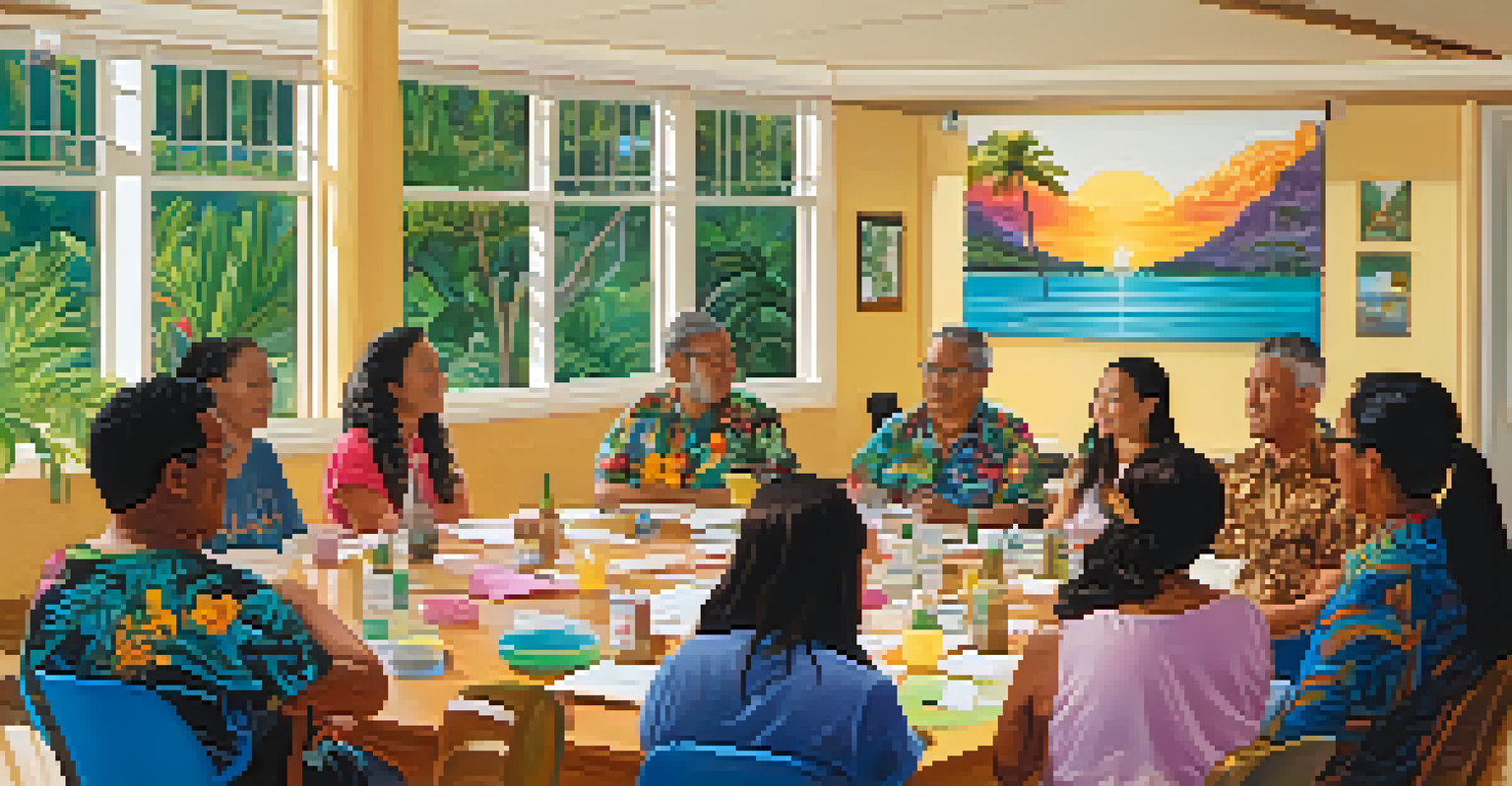Mental Health Issues in Hawaii: A Growing Concern for All

Understanding Mental Health Issues in Hawaii
Mental health issues in Hawaii have become increasingly prominent, reflecting a broader trend seen across the United States. From anxiety and depression to substance abuse, the struggles are multifaceted and affect diverse groups. These challenges are not just individual concerns; they ripple through families and communities, influencing overall well-being.
Mental health is not a destination, but a process. It's about how you drive, not where you're going.
The unique cultural landscape of Hawaii adds layers to these mental health challenges. Traditional values and communal lifestyles may clash with the growing pressures of modern life, creating stressors that can exacerbate mental health issues. Understanding these dynamics is crucial to addressing the needs of the population effectively.
Moreover, the beauty of Hawaii can sometimes mask these struggles. With picturesque beaches and vibrant landscapes, it might be easy to assume that residents lead idyllic lives. However, this façade can overshadow the serious mental health challenges many face, making it vital to bring these issues into the light.
The Impact of Isolation on Mental Health
Hawaii's geographical isolation can contribute significantly to feelings of loneliness and isolation. While the islands are surrounded by stunning ocean views, the physical distance from the mainland can make accessing mental health resources more challenging. This isolation can result in a lack of support networks for those struggling with mental health issues.

Additionally, the COVID-19 pandemic has exacerbated feelings of isolation for many residents. Lockdowns and travel restrictions have limited social interactions, leaving individuals more alone with their thoughts. As a result, mental health issues have surged, highlighting the need for community connection and support.
Cultural Awareness in Mental Health
Understanding and respecting Hawaiian cultural values is essential for effective mental health care and breaking down stigma.
Addressing isolation is crucial for improving mental health outcomes in Hawaii. Initiatives that foster community engagement, such as local support groups and wellness programs, can help bridge the gap. By creating spaces where individuals can share their experiences and support one another, the stigma surrounding mental health can be reduced.
Cultural Factors Influencing Mental Health
Cultural beliefs and practices play a significant role in how mental health is perceived in Hawaii. For many, discussing mental health issues can be seen as taboo, leading to reluctance in seeking help. This cultural stigma can hinder individuals from accessing the support they need, perpetuating cycles of suffering.
The greatest weapon against stress is our ability to choose one thought over another.
However, there is a growing recognition of the importance of cultural competence in mental health care. Providers who understand and respect Hawaiian values can create more effective treatment plans that resonate with patients. Integrating traditional practices with modern therapeutic approaches may enhance healing and foster a sense of belonging.
Community leaders and organizations are working to promote mental health awareness through culturally relevant programs. By celebrating Hawaiian heritage and encouraging open conversations about mental health, they aim to break down barriers and empower individuals to seek help without fear of judgment.
The Role of Education in Mental Health Awareness
Education is a powerful tool for combating mental health issues in Hawaii. By integrating mental health education into school curricula, young people can learn about emotional well-being from an early age. This proactive approach can help destigmatize mental health and encourage students to seek help when needed.
Schools can also serve as safe spaces for students to express their feelings and challenges. With trained counselors available, students can receive support and guidance in navigating their mental health journeys. This early intervention can make a significant difference in preventing more severe issues down the line.
Isolation Impacts Mental Wellness
Hawaii's geographical isolation contributes to loneliness and makes accessing mental health resources more challenging.
Community involvement in educational programs further enhances awareness. Workshops and seminars that include families can foster a supportive environment, where discussions about mental health are normalized. By empowering the next generation with knowledge, we can cultivate a more compassionate and understanding community.
Barriers to Accessing Mental Health Services
Despite the growing awareness of mental health issues, many individuals in Hawaii face barriers to accessing services. Geographic isolation, limited resources, and high costs can make it difficult for people to obtain the help they need. These obstacles can deter individuals from seeking treatment, resulting in untreated mental health conditions.
Furthermore, a shortage of mental health professionals in Hawaii exacerbates the problem. With fewer providers per capita, wait times can be long, and the availability of specialized care is often limited. This scarcity can leave individuals feeling frustrated and hopeless in their search for assistance.
Addressing these barriers requires a multifaceted approach that includes increasing funding for mental health programs and training more professionals. Telehealth services have also gained traction, offering a promising alternative for those who may have difficulty accessing in-person care. By expanding access, we can help ensure that everyone receives the support they deserve.
Community Initiatives Supporting Mental Health
In response to the rising mental health issues, various community initiatives have emerged across Hawaii. Local organizations are stepping up to provide resources, support, and education to individuals and families. These grassroots efforts play a crucial role in fostering a sense of community and belonging.
Programs such as peer support groups and mental health workshops offer safe spaces for individuals to share their experiences and learn from one another. Connecting with others who understand their struggles can be incredibly healing and empowering. These initiatives also emphasize the importance of self-care and resilience.
Community Initiatives Drive Change
Local organizations are pivotal in providing support and education, fostering a sense of belonging and resilience among individuals.
Moreover, collaborative efforts between government agencies, nonprofits, and community members are vital for creating a comprehensive support system. By pooling resources and knowledge, these partnerships can effectively address the diverse needs of the population. Together, they can create a brighter future for mental health in Hawaii.
The Future of Mental Health in Hawaii
Looking ahead, the future of mental health in Hawaii hinges on continued awareness and advocacy. As more individuals and organizations recognize the importance of mental health, there is hope for systemic change. By prioritizing mental health as a critical component of overall well-being, we can create a healthier society.
Innovative approaches, such as integrating mental health care into primary health services, can enhance accessibility and reduce stigma. This holistic method acknowledges the interconnectedness of physical and mental health, promoting a more comprehensive understanding of wellness.

Ultimately, fostering a culture of openness and support will be essential in addressing mental health issues. By encouraging transparent conversations and breaking down barriers, Hawaii can pave the way for a brighter, healthier future for all its residents. Together, we can cultivate a community where mental health is prioritized and everyone feels valued.